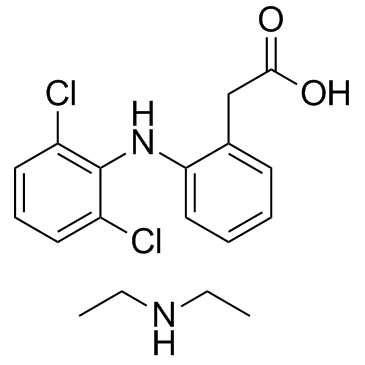78213-16-8
| Name | Diclofenac diethylamine |
|---|---|
| Synonyms |
N-ethylethanaminium {2-[(2,6-dichlorophenyl)amino]phenyl}acetate
Diclofenac diethylamine n-ethylethanamine 2-[(2,6-dichlorophenyl)amino]benzeneacetate UNII-6TGQ35Z71K 2-[(2,6-dichlorophenyl)amino]-benzeneacetic acid compd. with n-ethylethanamine (1:1) 2-[(2,6-dichlorophenyl)amino]-benzeneacetic acid compd. with n-ethylethanamine Diclofenac (diethylamine) MFCD01862249 Voltarol {2-[(2,6-Dichlorophenyl)amino]phenyl}acetic acid - N-ethylethanamine (1:1) Benzeneacetic acid, 2-[(2,6-dichlorophenyl)amino]-, compd. with N-ethylethanamine (1:1) 2-[2-(2,6-dichloroanilino)phenyl]acetic acid Diclofenac diethylammonium salt |
| Description | Diclofenac diethylamine is a potent and nonselective anti-inflammatory agent, acts as a COX inhibitor, with IC50s of 4 nM, 1.3 nM for human COX-1 and COX-2 in CHO cells, and 5.1, 0.84 μM for ovine COX-1 and COX-2, respectively. |
|---|---|
| Related Catalog | |
| Target |
Human COX-2:1.3 nM (IC50, in CHO cells) Human COX-1:4 nM (IC50, in CHO cells) Ovine COX-2:0.84 μM (IC50) Ovine COX-1:5.1 μM (IC50) |
| In Vitro | Diclofenac diethylamine is a potent COX inhibitor, with IC50s of 4 nM and 1.3 nM for human COX-1 and COX-2 in the CHO cells, respectively. Diclofenac effectively blocks COX-1 mediated prostanoid production from U937 cell microsomes, with an IC50 of 7 ± 3 nM[1]. Diclofenac sodium exihibits inhibition on COX-1 and COX-2 enzyme with IC50s of 5.1 and 0.84 μM, respectively[2]. |
| In Vivo | Diclofenac (3 mg/kg, b.i.d., for 5 days) significantly increases faecal 51Cr excretion in rats, and such effect is also observed in squirrel monkeys after administrated of 1 mg/kg twice daily for 4 days[1]. Diclofenac (10 mg/kg) shows anti-inflammatory activity in mice[2]. Diclofenac (10 mg/kg) decreases oxidized low-densitylipoprotein (Ox-LDL), but shows no effects on the kinetics parameters of catalase and glutathione peroxidase via intramuscularly injection into rats[3]. |
| Animal Admin | Rats[1] Male Sprague-Dawley rats (150 ± 200 g) are dosed orally with Diclofenac either once (acute dosing) or twice daily for 5 days (chronic dosing). A plasma sample is obtained 1 h after the morning dose on day 4 for measurement of Diclofenac concentration. Immediately after the administration of the last dose on day 5, the rats are injected via a tail vein with 0.5 mL of 51Cr-labelled red blood cells from a donor rat after incubation with sodium 51chromate. The rats are placed individually in metabolism cages with food and water ad libitum. Faeces are collected for a 48 h period and 51Cr faecal excretion is calculated as a % of total injected dose (20 mCi per animal)[1]. Squirrel monkeys[1] Squirrel monkeys (Saimiri sciureus; 0.8 ± 1.4 kg) are dosed orally with Diclofenac twice daily for 1 ± 5 days. One hour after administration of the last dose, 51CrCl3 in sterile saline (1 mL/kg, 4 ± 5 mCi per animal) is injected via a saphenous vein and plasma samples are obtained for measurement of Diclofenac concentration. The monkeys are then housed individually in metabolism cages. Faeces are collected for a 24 h period and 51Cr faecal excretion is calculated as a % of total injected dose[1]. |
| References |
| Boiling Point | 412ºC at 760 mmHg |
|---|---|
| Melting Point | 145-148ºC |
| Molecular Formula | C18H22Cl2N2O2 |
| Molecular Weight | 369.285 |
| Flash Point | 203ºC |
| Exact Mass | 368.105835 |
| PSA | 61.36000 |
| LogP | 5.44380 |
| HS Code | 2942000000 |
|---|
| HS Code | 2942000000 |
|---|
